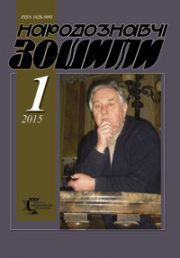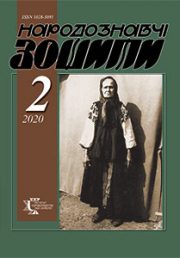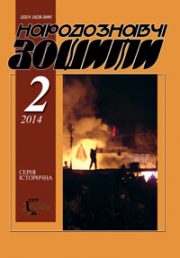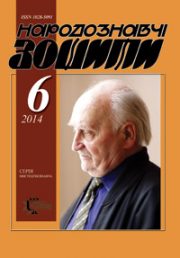The Ethnology Notebooks. 2017, 1 (133), 75–81
UDK 398.8 (477.8) “X-XVIII”
DOI https://doi.org/10.15407/nz2017.01.075
Received 26.01.2017
THE OLD-POKUTTIA`S SONGS OF UKRAINIANS AT Х—ХVIII CENTURIES IN IVAN FRANKO`S CREATIVE HERITAGE
Pankiv Mykhailo, PhD in History, аssociate Professor at the Educational and Scientific Institute of History, Ethnology and Archeology of the Carpathians of Vasyl Stefanyk Precarpathian National University
Shevchenka Street, 57, Ivano-Frankivs’k, Ukraine.
Contacts: +38(0342)59-61-87; e-mail: paskabogdan@i.ua
Abstract. In the article the author analyzes five old-pokuttia`s songs, which were used in Ivan Franko`s creative work, namely: scientific researches of songs «Ivan i Mariana», «Pro mandeburku», two songs, used in drama «Ukradene shchastia» — «Oi tam za horoiu, tam za kreminnoiu» and «Pro zhuravlia», also a song «Oi dube, dube», under the influence of which he wrote a poem «Oi ty dubochku, kucheriavyi». These songs were recorded by the author in 60—70-ies of XX century at Horodenka district.
Keywords: Ivan Franko, songs, drama «Ukradene shchastia», Mariana, Ivanochko, turchyn, bow and arrows, published works, respondents.
REFERENCES
Pan’kiv, M. (2013). Tekla krovtsia po Vkraini (toponimy, lehendy, perekazy pro tatars’ki napady na Prykarpattia z seredyny KhV do pochatku KhVIII stolittia). Ivano-Frankivs’k: Vyd-vo Prykarpats’kogo Natsional’nogo universytetu іm. V.~Stefanyka [in Ukrainian].
Andrusiak, M. & Pankіv, M. (2001). Pіsnі z Pokuttia (pіsnі zapysanі v selі Verbіvtsі Horodenkіvskoho r-nu). Ivano-Frankіvs’k: Nova Zoria [in Ukrainian].
Karpiv, J (Ed.). (2012). Pisenna tsaryna Marii Turyk. Iva-no-Frankivs’k: Simyk [in Ukrainian].
Rusalka Dnistrovaia. Fotokopiia vydan’ 1837 roku. (1972). Kyiv: Dnipro, 1972 [in Ukrainian].
Franko, I. (1955). Zhinocha nevolia v rus’kykh pisniakh. In O. Dej. (Ed.), Vybrani statti pro narodnu tvorchist’. Kyiv: Vydavnytstvo AN URSR, 1955 [in Ukrainian].
Franko, I. (1979). Ziv’iale lystia. In I. Franko. Zibrannia tvoriv u 50 tomakh (Vol. 2). Kyiv: Naukova dumka [in Ukrainian].
Franko, I. (1979). Ukradene schastia. In I. Franko. Zibrannia tvoriv u 50 tomakh (Vol. 24). Kyiv: Naukova dumka [in Ukrainian].
Franko, I. (1987). Fol’klorystychni pratsi. In I. Franko. Zibrannia tvoriv u 50 tomakh (Vol. 42). Kyiv: Naukova dumka [in Ukrainian].
Kolberg, O. (1963). Pokucie. Cz. 2: Dzieła wszystkie. (T. 30). Wrocław; Kraków: Polskie Wydawnictwo Muzyczne, Warszawa: Ludowa Spółdzielnia Wydawnicza [in Polish].
Kolberg, O. (1963). Pokucie. Cz. 3: Dzieła wszystkie. (T. 31). Wrocław; Kraków: Polskie Wydawnictwo Muzyczne, Warszawa: Ludowa Spółdzielnia Wydawnicza [in Polish].







